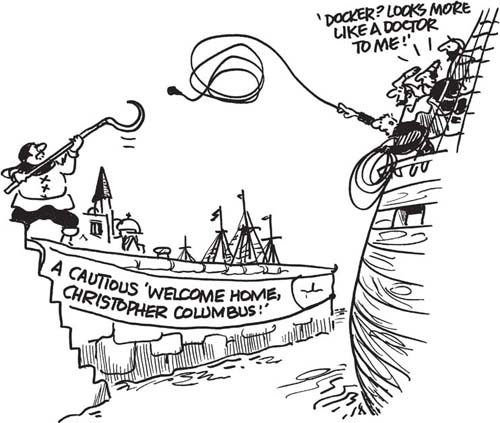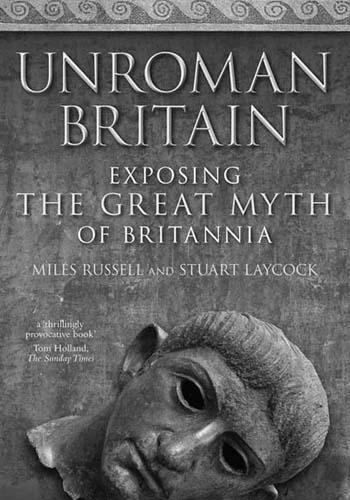Disgraceful Archaeology (14 page)
Read Disgraceful Archaeology Online
Authors: Paul Bahn
For a long time it was believed that syphilis was brought to Europe by Christopher Columbus — the rape of the New World brought pox to the Old. In recent years, however, a number of cases have been found which show this is not true. Columbus and his crew may have brought back a particularly virulent strain of the disease, but it was already in Europe long before — perhaps often mistaken for leprosy (
69
).

69
One of the earliest cases recorded is from a medieval Essex girl — the skeleton of a woman aged between 25 and 50 was unearthed in a churchyard in Rivenhall, near Witham. She lived sometime between 1290 and 1445, and seems to have contracted the venereal form of syphilis up to ten years before her death.
But Essex was not alone. Hull too has yielded evidence of pre-Columbus syphilis in four skeletons unearthed from a mid-fifteenth-century Augustinian friary. They had fully developed tertiary syphilis, which shows that the Great Pox — or ‘the French disease’ as it became known — was already well established in Europe at least half a century before Columbus set sail.
The disease brought out xenophobia everywhere: in Holland it was known as the Spanish disease, in Russia the Polish disease, in Siberia the Russian disease, in Turkey the Christian disease, and in India and Japan the Portuguese disease! Desperate measures were taken from the start in an effort to combat it — dieting, haircutting, blood-letting, steam baths, and especially the application of mercury (
70
).
For example, the skull of Isabella d’Aragona (1470–1524), an Italian noblewoman who was a possible inspiration for Leonardo da Vinci’s Mona Lisa, has teeth coated with a black layer. She had tried so hard to remove it that the enamel on her incisors was rubbed away. Analysis of the black layer showed that it was caused by mercury intoxication — inhalation of mercury fumes was common at that time as a treatment for syphilis. It eventually caused inflammation of the teeth and, in fact, Isabella’s death was probably caused by the mercury treatment rather than the syphilis!

70
Bailey, M. 1991. Cupboard love: sex secrets of the British Museum.
The Observer
, 7 July, p. 7.
Barnes, G. D. 1984.
Kirkstall Abbey, 1147–1549: an historical study.
The Thoresby Society: Leeds.
Bourke, J. G. 1891.
Scatalogic Rites of all Nations. A dissertation upon the employment of excrementitious remedial agents in religion, therapeutics, divination, witchcraft, love-philters, etc, in all parts of the globe, based upon original notes and personal observation, and upon compilation from over one thousand authorities.
W. H. Lowdermilk & Co.: Washington D. C.
Cherici, P. 1995.
Celtic Sexuality. Power, Paradigms and Passion.
Duckworth: London.
Dover, K. J. 1978.
Greek Homosexuality.
Duckworth: London.
Faerman, M.
et al.
1998. Determining the sex of infanticide victims from the late Roman era through Ancient DNA analysis.
Journal of Arch. Science
25: 861–65.
Garland, R. 1995.
The Eye of the Beholder. Deformity and Disability in the Graeco-Roman World.
Duckworth: London.
Grant, M. & Mulas, A. 1982.
Eros in Pompeii. The Secret Rooms of the National Museum of Naples.
Bonanza Books: New York.
Kauffmann-Doig, F. 1979.
Sexual Behaviour in Ancient Peru.
Kompaktos: Lima.
Keuls, E. C. 1993.
The Reign of the Phallus. Sexual Politics in Ancient Athens.
Univ. of California Press: Berkeley.
Koman, K. 1995. Sexy words, raunchy pictures 1200 AD.
Harvard Magazine
, Sept/Oct, pp. 15–18.
Kuntz, T. 1998. At Harvard, a political sex scandal that’s not news, but ancient history.
The New York Times
, October 18.
Lewin, R. 1999.
Merde: Excursions into scientific, cultural and socio-historical coprology.
Aurum Press: London.
Lister, A. M. 1997. Remedies for windy camels.
Nature
390: 658–59.
Manniche, L. 1987.
Sexual Life in Ancient Egypt.
Routledge & Kegan Paul: London.
Mannix, D. P. 1960.
Those About to Die…
Panther Books: London.
Maulucci Vivolo, F. P. 1993.
Pompei. I Graffiti Figurati.
Bastogi Editrice Italiana: Foggia.
May, P. 1997. The oldest jokes of all.
MAG (Museums and Galleries)
, July/Aug.: p. 6.
McCall, A. 1979.
The Medieval Underworld
. Hamish Hamilton: London.
McKeown, J. C. 2010.
A Cabinet of Roman Curiosities: Strange tales and surprising facts from the world’s greatest empire
. Oxford University Press: Oxford.
Miles, C. & Norwich, J. J. 1997.
Love in the Ancient World.
Weidenfeld & Nicolson: London.
Paludan, A. 1998.
Chronicle of the Chinese Emperors.
Thames & Hudson: London.
Paris, M. 1867.
English History
, vol III. (transl. J. A. Giles).
Pomeroy, S. B. 1975.
Goddesses, Whores, Wives and Slaves — Women in Classical Antiquity.
Schocken Books: New York.
Sabine, E. L. 1933. Butchering in Mediaeval London.
Speculum. A Journal of Medieval Studies
8: 335–53.
Sabine, E. L. 1934. Latrines and cesspools of Mediaeval London.
Speculum. A Journal of Medieval Studies
9: 303–21.
Salzmann, L. F. 1913.
Mediaeval Byways.
Constable: London.
Scarre, C. J. 1995.
Chronicle of the Roman Emperors.
Thames & Hudson: London.
Smith, H. 1998. World’s first brothel unearthed.
The Guardian
, May 27.
Taylor, T. 1996.
The Prehistory of Sex, Four Million Years of Human Sexual Culture.
Fourth Estate: London.
Vallee, B. L. 1998. Alcohol in the Western World.
Scientific American
278 (6): 62–67.
Wise, K., Clark, N. R. & Williams, S. R. 1994. A late Archaic period burial from the South-Central Andean coast.
Latin American Antiquity
5 (3): 212–27.
Woodhouse, H. C. 1998. ‘Medicine’ on the rocks.
S. Afr. J. Ethnology
21 (3): 206–7.
First published 1999
This revised and extended edition published 2012
The History Press
The Mill, Brimscombe Port
Stroud, Gloucestershire, Gl5 2QG
This ebook edition first published in 2012
All rights reserved
© Paul Bahn & Bill Tidy, 1999, 2012
The right of Paul Bahn & Bill Tidy, to be identified as the Authors of this work has been asserted in accordance with the Copyrights, Designs and Patents Act 1988.
This ebook is copyright material and must not be copied, reproduced, transferred, distributed, leased, licensed or publicly performed or used in any way except as specifically permitted in writing by the publishers, as allowed under the terms and conditions under which it was purchased or as strictly permitted by applicable copyright law. Any unauthorised distribution or use of this text may be a direct infringement of the author’s and publisher’s rights, and those responsible may be liable in law accordingly.
EPUB ISBN
978 0 7524 8333 7
MOBI ISBN
978 0 7524 8332 0
Original typesetting by The History Press
Ebook compilation by RefineCatch Limited, Bungay, Suffolk
ALSO AVAILABLE FROM THE HISTORY PRESS

UNROMAN BRITAIN
EXPOSING THE GREAT MYTH OF BRITANNIA
by Miles Russell & Stuart Laycock
a ‘thrillingly provocative book’ – Tom Holland,
The Sunday Times
978 0 7524 6285 1